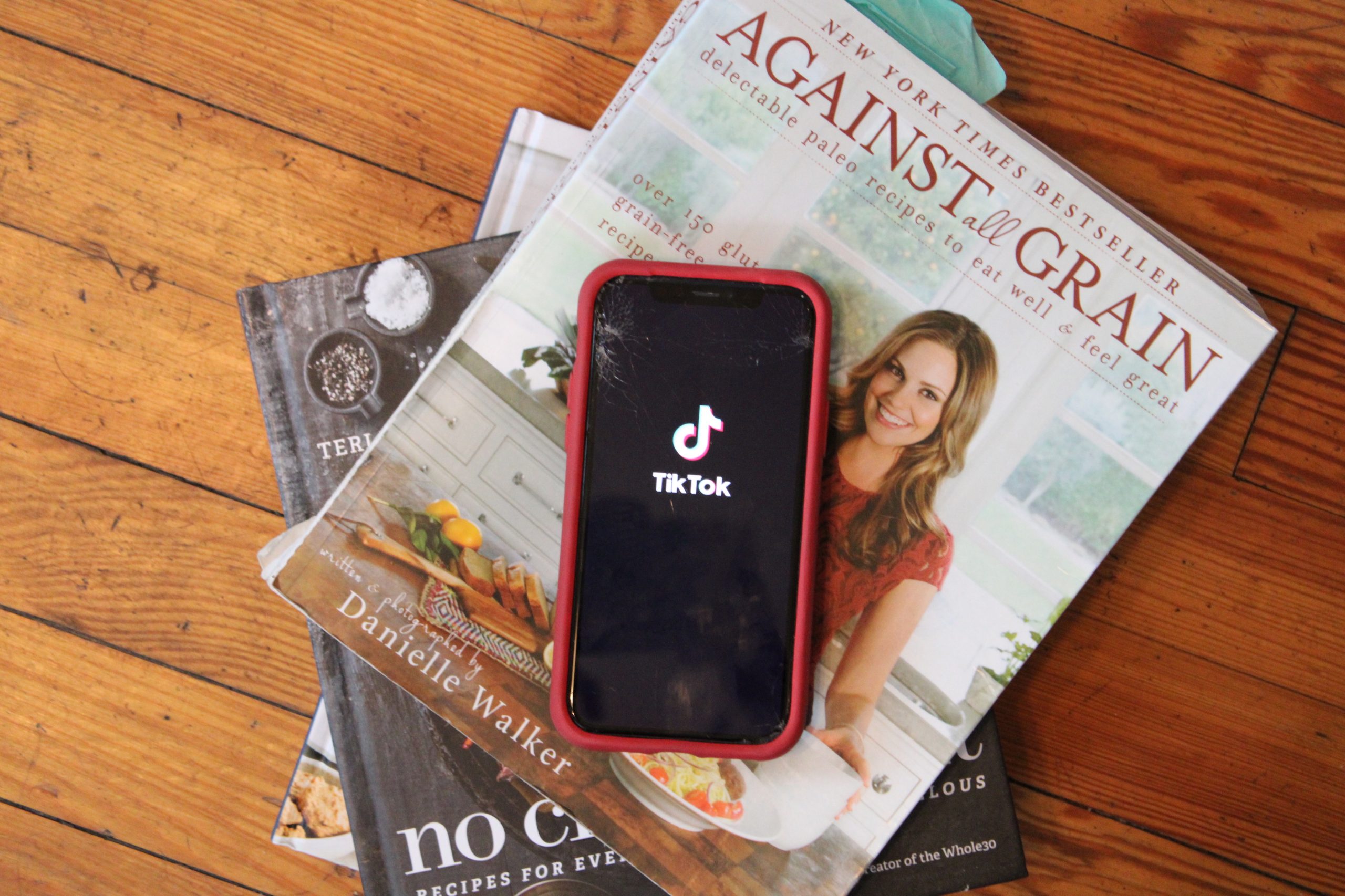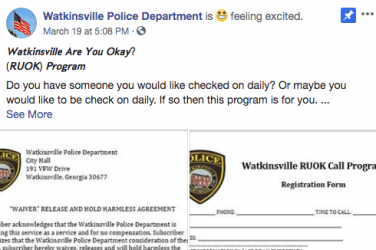At the start of quarantine, University of Georgia junior Kathryn Santos felt lonely and discouraged. Like many other college students, life as she once knew was flipped upside down as classes went virtual, residential student living closed and isolation went into full effect.
With more alone time came more opportunities for Santos to mindlessly scroll social media, especially TikTok, her platform of choice. But unlike users who had a feed full of baking recipes, dance routines and comedy skits, Santos’ TikTok feed consisted of unattainable exercise and diet regimens.
“A big push that I noticed during the pandemic on social media was to work out and to get healthy. But a lot of people took that as ‘be skinny,’” Santos said. There was pressure, she said, to “thin up” before classes resumed in August.
Why It’s Newsworthy: College students increased their social media use during the pandemic. Platforms such as TikTok and Instagram have broadcasted diet culture-related content across users’ feeds, serving as a trigger to those with a history of eating disorders.
Santos is not alone. A July 2020 study from the International Journal of Eating Disorders found wide-ranging effects on eating disorders during the early stages of the pandemic, such as increases in food restriction and urges to binge.
These concerns were raised by individuals in eating disorder recovery, who noted relapses. Other groups noticed as well.
“We were all on our phones as a way to connect to people while we had to be alone,” said Giulia Carlton, a senior advertising major. She serves as the ambassador for the UGA chapter of CHAARG, a national community that supports college women who seek healthy fitness goals.
“And obviously seeing all the Instagram models and all the body image issues contributes to that. And also kind of leads people to spiral into,” she said, “not eating or feeling bad about themselves and then binge eating.”
A Lifelong Battle
Santos recalls first struggling with body image and food at eight years old. Growing up, she dealt with bulimia, and said her struggle continued when she started at UGA in 2018.
“I’ve always been really self-conscious about who I am as a person, emotionally and physically,” said Santos, adding that she would compare herself to other girls in her college sorority.
“To me, in order to fit in, I had to be small. I had to be skinny,” she said.
Still, Santos said things were looking up as she formed closer friendships her sophomore year. While living in her sorority house, she was constantly surrounded by a consistent support system, and felt less room for loneliness and self-doubt.
When the pandemic hit in March, UGA closed all of its residential living facilities, which included Greek life housing. For Santos, that meant leaving her friends, moving in with her boyfriend and braving a new chapter of her battle with her eating disorder.
While living with her boyfriend, Santos said she could get away with eating very little. She said because her boyfriend had the “stomach of a bird,” he oftentimes would have little to no appetite. This allowed Santos to make big meals, and then only eat bits and pieces as her boyfriend would unconsciously eat in similar ways.
Santos also said that her boyfriend would be at work most of the time during quarantine. With more time alone, Santos said the pandemic first appeared as an opportunity to practice unhealthy diet and exercise habits without anyone holding her back. While in quarantine, Santos downloaded the popular video-sharing app TikTok, and returned to other popular social media apps, like Instagram.
“I was alone and so I didn’t have anybody there to check me,” Santos said. “This was our chance to just get away with it, and nobody would know.”
On the Apps
Throughout the pandemic, the UGA chapter of CHAARG says it has worked to build a close community for people like Santos— those experiencing these feelings of loneliness and lack of confidence, particularly from media consumption. For people like her, disordered eating habits got worse during the pandemic.
Carlton said that in addition to user content, social media advertisements can also play a role in diet culture and peoples’ view of themselves.
“We see so many Instagram advertisements for Flat Tummy Tea or things like that. I think the more you’re exposed to it, the more you kind of believe ‘Oh, maybe I should try this or maybe it does work,’” Carlton said. “This repetitive exposure on social media does contribute to that reliance on diet culture.”
Santos said that Instagram had always played a large role in motivating her unhealthy behaviors while growing up. For this reason, she spent time away from Instagram to avoid triggering content.
But when the pandemic struck and boredom kicked in, she returned to the photo-sharing app and was welcomed with diet culture content once again. Santos said nearly every picture she’d see while scrolling was of someone in a bathing suit or trying out new workout challenges. These photos felt very “diet-crazed,” she said.
Santos’ feed of fitness fads and low-calorie meals looked similar to the feeds of many other young adults during quarantine. This, along with exposure to stressful media coverage and the increased use of video-conferencing all contributed to increased risk of disordered eating, according to a June 2020 study published by the International Journal of Eating Disorders.
Fighting and Filtering
To combat diet culture, Carlton said CHAARG has hosted informative events aiming to educate young women on the harms of popularized fitness and diet trends. But in addition to educating themselves, she also suggests they consciously filter their social media content.
For Santos, deleting Instagram was the best solution. She also curated her TikTok page to rid triggering videos, creating a more positive scrolling experience.
“Whenever something would pop up that just negatively affected me, I would literally just click ‘Do not show again,’” she said. “That genuinely did help me.”
Another tactic Santos implemented was following creators who post empowering and authentic content about body positivity and health.
Molly James, an 18-year-old TikTok creator from Michigan, produces this kind of content to inspire her followers in their mental and physical health journeys, and make them feel more comfortable.
“There’s always going to be bad videos on the internet. And when it comes to food videos … it can be really unhealthy and get bad to a certain extent,” James said.
James said she has come across TikTok content that quickly triggers unhealthy comparisons or encourages restrictive diets. She aims to make her videos as authentic as possible by showcasing a balance of gym workouts and healthy recipes along with trips to Burger King and late-night snacking.
“It makes others feel at peace … because they’re like ‘Wow, I can do that,” she said. “I shouldn’t feel ashamed of myself for eating that much food or not eating a lot of food. I’m not going to try and meet somebody else’s standards.”
By following content like James’, Santos said her eating disorder improved as the pandemic continued. In addition, she created an eating and exercise regimen she could maintain. Confiding in loved ones and health professionals also helped her overcome her struggles.
“My biggest piece of advice for anybody also struggling is to talk to people, because I always had the biggest fear that people were gonna judge me,” Santos said. “But whenever I finally opened up about it, I learned that a lot more people struggle with this than I originally thought. And so you feel less alone.”
Emma Robinson is a junior majoring in journalism in the Grady College of Journalism and Mass Communication at the University of Georgia.
Lily O’Connor and Dalaney Hans contributed to this report. O’Connor is a senior and Hans is a junior; both are majoring in journalism at the Grady College of Journalism and Mass Communication at UGA.










Show Comments (0)